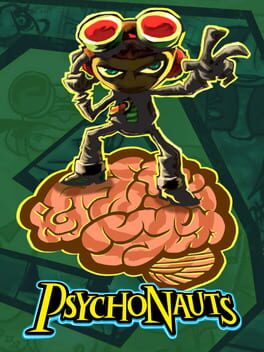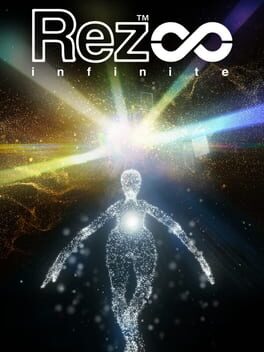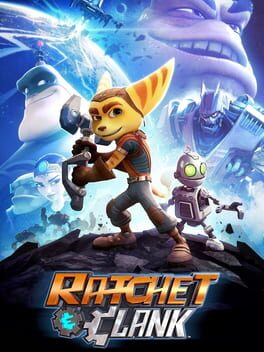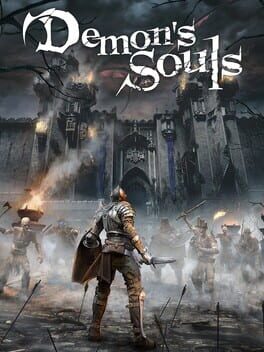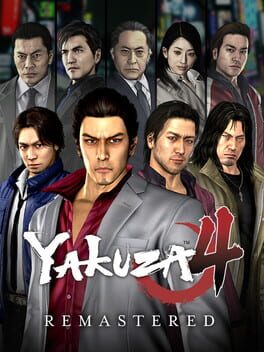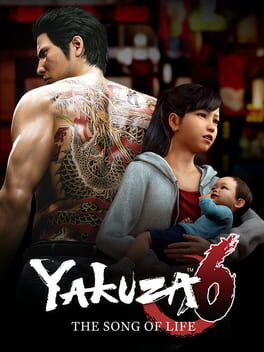emilem
2005
It's honestly surprising that after nearly 20 years, Psychonauts doesn't have many copycats.
From a surface level, Psychonauts is a platforming adventure game, with elements of a collect-a-thon scattered here and there. But dive deeper and you'll find it has the heart of a Point-n-click adventure buried within, which is no surprise given the LucasArts lineage that developed this game.
In some areas it hasn't aged well, platforming can be janky (especially with Levitation) and most of the bosses are either painfully tedious or shockingly easy. But so much of it is a distinct and vibrant romp, from characters, levels, and gameplay design, it sticks out far above the rest.
From a surface level, Psychonauts is a platforming adventure game, with elements of a collect-a-thon scattered here and there. But dive deeper and you'll find it has the heart of a Point-n-click adventure buried within, which is no surprise given the LucasArts lineage that developed this game.
In some areas it hasn't aged well, platforming can be janky (especially with Levitation) and most of the bosses are either painfully tedious or shockingly easy. But so much of it is a distinct and vibrant romp, from characters, levels, and gameplay design, it sticks out far above the rest.
2022
What a truly wonderful game Pentiment is.
It's nice to see companies like Obsidian willing to hedge their bets on a game so truly niche, what other companies would look at as something "difficult to market". Sure, it has Josh Sawyer at the helm, which allows people to claim it's "by the mind behind Fallout: New Vegas", but even still its truly inspiring to see something like this come out from a big studio.
And what a fine choice they made, Pentiment is a deeply intricate, well written narrative adventure that made me regret not paying more attention in GCSE history. Its knowledge of 16th century Europe is fascinating, but if the pages upon pages worth of history on Monastic Scriptures don't hook you (which, frankly, it should) the story it tells is one to behold.
It's a murder mystery, that tells an enthralling tale over three points in time, towards the end I had prepared myself for a vague sort of ending, where interpretation is left to the viewer, and yet I was pleasantly surprised by an exceptionally neat bow tied around the story, with a fantastic message about our place in history and the impact we have on our futures to boot.
The controls are a little janky, and the prose can get a little heavy, but this is more than made up for with its benchmark writing and stunning art.
It's nice to see companies like Obsidian willing to hedge their bets on a game so truly niche, what other companies would look at as something "difficult to market". Sure, it has Josh Sawyer at the helm, which allows people to claim it's "by the mind behind Fallout: New Vegas", but even still its truly inspiring to see something like this come out from a big studio.
And what a fine choice they made, Pentiment is a deeply intricate, well written narrative adventure that made me regret not paying more attention in GCSE history. Its knowledge of 16th century Europe is fascinating, but if the pages upon pages worth of history on Monastic Scriptures don't hook you (which, frankly, it should) the story it tells is one to behold.
It's a murder mystery, that tells an enthralling tale over three points in time, towards the end I had prepared myself for a vague sort of ending, where interpretation is left to the viewer, and yet I was pleasantly surprised by an exceptionally neat bow tied around the story, with a fantastic message about our place in history and the impact we have on our futures to boot.
The controls are a little janky, and the prose can get a little heavy, but this is more than made up for with its benchmark writing and stunning art.
2023
Very rarely will I review a game that I haven't completed. I don't think it's fair. But I'm going to make an exception for Starfield.
This game is a testament to Bethesda's refusal to improve. A belief that they don't need to. Perhaps in a year where they've been forced to go toe-to-toe with a competent RPG in Baldur's Gate III (in fairness, not one I've played, but I think I could safely say it trumps Starfield in every capacity) they'll finally see that they can no longer rest on their laurels.
Starfield is by no means a game made incompetently, it's technically impressive, especially by Bethesda's standards. The gunplay is good, the game looks pretty, and the tech aspects are quite cool. But the story and RPG elements are severely lacking.
The game is vapid and empty, it's white noise, it's the video game equivalent of eating flour. I played for twenty hours and not once did I find anything that was remotely engaging. Nothing about the main story engaged me, the "mystery" of the artefacts was completely worthless because all it was just "weird floating rocks", at least until TEN HOURS IN when it was suddenly revealed they give force powers. That's right, in the time it takes to FULLY COMPLETE games that have FAR MORE INTERESTING THINGS TO SAY than Starfield, Starfield is only just getting round to revealing a core mechanic. And the side quests have nothing I was interested in, they just flooded by quest list as I was walking around, assuming that I was tuning in to every conversation happening around me from nameless NPCs.
Ultimately I think that's what it boils down to, Starfield ASSUMES I already care about everything that's happening in the world, and therefore does nothing to try and pull me in. It ASSUMES I care about the artefacts, so doesn't need to actually engage me in a mystery. It ASSUMES I want to join every faction, so doesn't actually tell me anything about these factions. It ASSUMES I'm going to get really invested in the base building mechanics, so never stops to tell me what the value in it is.
One day I will come back to this game, I will finish it, I will write an essay about it, there's plenty here to write about, I didn't even get started on the godforsaken ship combat. But for now, I'm not investing any time in it. For now all I can say is Bethesda need to start learning from their contemporaries and stop assuming they're the gold standard for western RPGs. I'm not sure they ever were.
This game is a testament to Bethesda's refusal to improve. A belief that they don't need to. Perhaps in a year where they've been forced to go toe-to-toe with a competent RPG in Baldur's Gate III (in fairness, not one I've played, but I think I could safely say it trumps Starfield in every capacity) they'll finally see that they can no longer rest on their laurels.
Starfield is by no means a game made incompetently, it's technically impressive, especially by Bethesda's standards. The gunplay is good, the game looks pretty, and the tech aspects are quite cool. But the story and RPG elements are severely lacking.
The game is vapid and empty, it's white noise, it's the video game equivalent of eating flour. I played for twenty hours and not once did I find anything that was remotely engaging. Nothing about the main story engaged me, the "mystery" of the artefacts was completely worthless because all it was just "weird floating rocks", at least until TEN HOURS IN when it was suddenly revealed they give force powers. That's right, in the time it takes to FULLY COMPLETE games that have FAR MORE INTERESTING THINGS TO SAY than Starfield, Starfield is only just getting round to revealing a core mechanic. And the side quests have nothing I was interested in, they just flooded by quest list as I was walking around, assuming that I was tuning in to every conversation happening around me from nameless NPCs.
Ultimately I think that's what it boils down to, Starfield ASSUMES I already care about everything that's happening in the world, and therefore does nothing to try and pull me in. It ASSUMES I care about the artefacts, so doesn't need to actually engage me in a mystery. It ASSUMES I want to join every faction, so doesn't actually tell me anything about these factions. It ASSUMES I'm going to get really invested in the base building mechanics, so never stops to tell me what the value in it is.
One day I will come back to this game, I will finish it, I will write an essay about it, there's plenty here to write about, I didn't even get started on the godforsaken ship combat. But for now, I'm not investing any time in it. For now all I can say is Bethesda need to start learning from their contemporaries and stop assuming they're the gold standard for western RPGs. I'm not sure they ever were.
1999
Proof that just because something is revolutionary, doesn't mean it's good.
I'm 20 years late on this one, and maybe that's why I'm missing the appeal of the game because I don't have the nostalgia glasses on, but I really don't understand the hype that Shenmue gets.
Sure, the NPCs have routines, and sure you can talk with all of them in this immersive world. But when 99% of the NPCs regurgitate the same responses, refuse to talk to you, or just point you in the direction of the 1% you DO need to talk to, what is that adding to the game?
All of the ideas presented by Shenmue are good on paper, but executed poorly. Exploring the world to investigate a mystery? Good! Having the "investigation" be asking people the same questions ad infinitum until exposition happens? Not so good. A day night cycle with characters following a routine? Good! Locking players off from certain things until a certain time and not allowing them to advance time in hour-long loops? Not good. I mean for gods sake the whole game up until finding Charlie is a wild goose chase that leads nowhere until you get the Chinese letter!
I'll admit that Shenmue popularised a lot of really interesting mechanics, I won't say it introduced them when examples can be see elsewhere (see Mizzurna Falls doing a lot of what Shenmue did the year prior), but when they're presented like this it makes for a slog that doesn't want to show off the one feature the whole concept was based around; the fighting, which is actually really good!
I'm sure we haven't seen the last of Shenmue, and I will play the others, so I only hope that they learn to take these incredibly interesting ideas and really show what you can do with them, realism is all well and good but when you try to make a game too realistic, you end up losing what makes a video game fun.
I'm 20 years late on this one, and maybe that's why I'm missing the appeal of the game because I don't have the nostalgia glasses on, but I really don't understand the hype that Shenmue gets.
Sure, the NPCs have routines, and sure you can talk with all of them in this immersive world. But when 99% of the NPCs regurgitate the same responses, refuse to talk to you, or just point you in the direction of the 1% you DO need to talk to, what is that adding to the game?
All of the ideas presented by Shenmue are good on paper, but executed poorly. Exploring the world to investigate a mystery? Good! Having the "investigation" be asking people the same questions ad infinitum until exposition happens? Not so good. A day night cycle with characters following a routine? Good! Locking players off from certain things until a certain time and not allowing them to advance time in hour-long loops? Not good. I mean for gods sake the whole game up until finding Charlie is a wild goose chase that leads nowhere until you get the Chinese letter!
I'll admit that Shenmue popularised a lot of really interesting mechanics, I won't say it introduced them when examples can be see elsewhere (see Mizzurna Falls doing a lot of what Shenmue did the year prior), but when they're presented like this it makes for a slog that doesn't want to show off the one feature the whole concept was based around; the fighting, which is actually really good!
I'm sure we haven't seen the last of Shenmue, and I will play the others, so I only hope that they learn to take these incredibly interesting ideas and really show what you can do with them, realism is all well and good but when you try to make a game too realistic, you end up losing what makes a video game fun.
2016
I'm not one to call a game perfect, there's always something that could be improved to make it just right. But Rez is perfect.
It accomplishes what it set out to do. It's an art piece, an audio and visual spectacle, a skillful shooter. It was all of these things when it came out 20 years ago and Infinite adds more. It's somehow like this game was made for VR, before VR was anywhere near what it is today. And Area X is something to behold.
All of that aside, the core five areas of Rez are unforgettable, weaving you through a story that says so much while barely saying anything at all. All while providing a rhythmic on rails shooter that's all killer and no filler.
I could go on singing this games praises for eternity, and I'm sure I will, but it's best experienced yourself. Find some headphones, dim the lights, grab your controller.
Welcome to Synaesthesia.
It accomplishes what it set out to do. It's an art piece, an audio and visual spectacle, a skillful shooter. It was all of these things when it came out 20 years ago and Infinite adds more. It's somehow like this game was made for VR, before VR was anywhere near what it is today. And Area X is something to behold.
All of that aside, the core five areas of Rez are unforgettable, weaving you through a story that says so much while barely saying anything at all. All while providing a rhythmic on rails shooter that's all killer and no filler.
I could go on singing this games praises for eternity, and I'm sure I will, but it's best experienced yourself. Find some headphones, dim the lights, grab your controller.
Welcome to Synaesthesia.
2016
There's not much I think I can say about Ratchet and Clank, technically being my first full experience of a game in the franchise.
It's a lot of fun, and has a wide variety of weapons to play with. I mostly switched between all of them at one point or another but it would be nicer if there were an easier weapon switching system in place, the D-Pad hotkey encourages limiting the arsenal to four which isn't great.
The story feels somewhat disjointed, but for a game of a film of a game that's not surprising, it's having to fill in gaps that the film didn't have but needed to be made to introduce gameplay which makes the pacing a bit odd.
Overall it's just a fun, simple experience, and at the very least has made me curious about trying the rest of the franchise at some point.
It's a lot of fun, and has a wide variety of weapons to play with. I mostly switched between all of them at one point or another but it would be nicer if there were an easier weapon switching system in place, the D-Pad hotkey encourages limiting the arsenal to four which isn't great.
The story feels somewhat disjointed, but for a game of a film of a game that's not surprising, it's having to fill in gaps that the film didn't have but needed to be made to introduce gameplay which makes the pacing a bit odd.
Overall it's just a fun, simple experience, and at the very least has made me curious about trying the rest of the franchise at some point.
2020
I expected a challenge going into Demon's Souls, what I didn't anticipate (but should have), was how much of a challenge.
The remake is faithful almost 100% to the original, for better or worse. Some of the design choices are questionable, and most of it was remedied when Dark Souls came out. The tendency system is horrifically flawed, and punishes you for failure, which is highly offputing if you do want to try and finish it.
During this game's best moments it's an engaging, incredibly satisfying gauntlent, at it's worst it's a frustrating ordeal that feels like it's laughing at you for trying.
The remake is faithful almost 100% to the original, for better or worse. Some of the design choices are questionable, and most of it was remedied when Dark Souls came out. The tendency system is horrifically flawed, and punishes you for failure, which is highly offputing if you do want to try and finish it.
During this game's best moments it's an engaging, incredibly satisfying gauntlent, at it's worst it's a frustrating ordeal that feels like it's laughing at you for trying.
2007
While the core gameplay of No More Heroes is immensely enjoyable, it is buried under a pretty dull and repetitive job system which is needed to progress.
The minigames aren’t too bad but the sheer amount of times you need to play them to earn enough money makes it such a slog. That being said, when you do get to engage in the combat, it's such an immense amount of fun that really should have been capitalised on more.
Each of the bosses are distinct, and require different playstyles to tackle, creating some really interesting and memorable fights. It's just a shame it only makes up about 30% of the game.
The minigames aren’t too bad but the sheer amount of times you need to play them to earn enough money makes it such a slog. That being said, when you do get to engage in the combat, it's such an immense amount of fun that really should have been capitalised on more.
Each of the bosses are distinct, and require different playstyles to tackle, creating some really interesting and memorable fights. It's just a shame it only makes up about 30% of the game.
2018
Spider-Man is a good game on the verge of being great, it's combat mechanics and characters are incredible, but they're held back by questionable enemy designs and a choppy story.
Its combat is immensely satisfying, but with enemies constantly wailing on you (granted I was playing on Spectacular mode) and mostly forgettable boss fights, it doesn't reach it's full potential.
This may also be the best representation of Spider-Man's characters in any medium, but they're all actors in a cobled-together story with odd pacing. Spider-Man comes close, and is absolutely the best Spider-Man game I've played, but it still needs some fine tuning
Its combat is immensely satisfying, but with enemies constantly wailing on you (granted I was playing on Spectacular mode) and mostly forgettable boss fights, it doesn't reach it's full potential.
This may also be the best representation of Spider-Man's characters in any medium, but they're all actors in a cobled-together story with odd pacing. Spider-Man comes close, and is absolutely the best Spider-Man game I've played, but it still needs some fine tuning
Miles Morales does a lot to improve on it's predecessor. It's story is vastly more cohesive (granted, pretty short), it's enemies are more fun to fight, and it's bosses aren't as gimmicky and actually provide an engaging challenge.
Miles, being a rookie hero, has a far more interesting development than Peter, and the message of the game; Be Greater, Be Yourself (in itself a clever expansion on the original's "Be Greater"), resonates beautifully throughout it. Even Miles' animations say so much about his character, he has boundless confidence while flying through New York, yet still stumbles every now and then on the landings, he still has a lot to learn.
The only issues that remain were that I never felt overly compelled to explore the sub-stories throughout NYC, aside from Uncle Aaron's Mix-tape, which was just an incredible side-story as opposed to a collect-a-thon
Miles, being a rookie hero, has a far more interesting development than Peter, and the message of the game; Be Greater, Be Yourself (in itself a clever expansion on the original's "Be Greater"), resonates beautifully throughout it. Even Miles' animations say so much about his character, he has boundless confidence while flying through New York, yet still stumbles every now and then on the landings, he still has a lot to learn.
The only issues that remain were that I never felt overly compelled to explore the sub-stories throughout NYC, aside from Uncle Aaron's Mix-tape, which was just an incredible side-story as opposed to a collect-a-thon
When I started playing Like a Dragon, it was difficult. I missed the old combat system, and I missed playing as Kiryu. It made the game a bit of a slog for the first half, and in my defense, the first half is a slow burner.
However, come the second half I came to terms with the fact that this was the new normal for Yakuza, that Ichiban and his crew were here to stay, along with the turn-based mechanics. Once I overcame that hurdle I was able to truly enjoy the game and it's unique combat system. And even though it starts slow at first, Ichiban's story is one of Yakuza's best. Kiryu was always stern and straight-faced, but Ichiban is incredibly emotional and that paves the way for some truly touching scenes that will stick with me for a long time.
There's a lot here I don't like still, some of the bosses suffer from the age old JRPG issue of requiring lengthy grinds to progress, and with these bosses once you find one effective move you loop it over and over until they die, it's something I hope they improve on with the inevitable sequel.
But there's so much to do here, so much to enjoy, and such an incredibly colourful roster of characters that I can't help but be completely enamoured by Like A Dragon, as much as I prefer the old combat system.
However, come the second half I came to terms with the fact that this was the new normal for Yakuza, that Ichiban and his crew were here to stay, along with the turn-based mechanics. Once I overcame that hurdle I was able to truly enjoy the game and it's unique combat system. And even though it starts slow at first, Ichiban's story is one of Yakuza's best. Kiryu was always stern and straight-faced, but Ichiban is incredibly emotional and that paves the way for some truly touching scenes that will stick with me for a long time.
There's a lot here I don't like still, some of the bosses suffer from the age old JRPG issue of requiring lengthy grinds to progress, and with these bosses once you find one effective move you loop it over and over until they die, it's something I hope they improve on with the inevitable sequel.
But there's so much to do here, so much to enjoy, and such an incredibly colourful roster of characters that I can't help but be completely enamoured by Like A Dragon, as much as I prefer the old combat system.
2019
I was expecting to have to wait a bit after 3 for Yakuza to really get into full swing again, but my god this game takes everything wrong with it's predecessor and massively improves on it.
No more stupid enemies that do nothing but block, and even if you have heavy blockers, your attacks now break them. No more stupid "Feel the Heat" where you have to mash R2 (???) to get an advantage. No more weak-ass Heat moves, all of them now do significant damage. Stepping into 4 was like stepping out the other end of the tunnel, Yakuza is back in full form and it's incredible.
However, while they've done a good job with making all these in-depth characters to control, I don't feel like I get enough time with them. I barely had a chance to get to fully explore Saejima before I'm whisked away to Tanimura, and Kiryu's chapter is miniscule in comparison, mainly used to round everyone up before Requiem. Sure I could spend time grinding the Master or IFR-7 sub-stories, but that doesn't change that the story brushes past them too quick.
The music is fucking sick though.
No more stupid enemies that do nothing but block, and even if you have heavy blockers, your attacks now break them. No more stupid "Feel the Heat" where you have to mash R2 (???) to get an advantage. No more weak-ass Heat moves, all of them now do significant damage. Stepping into 4 was like stepping out the other end of the tunnel, Yakuza is back in full form and it's incredible.
However, while they've done a good job with making all these in-depth characters to control, I don't feel like I get enough time with them. I barely had a chance to get to fully explore Saejima before I'm whisked away to Tanimura, and Kiryu's chapter is miniscule in comparison, mainly used to round everyone up before Requiem. Sure I could spend time grinding the Master or IFR-7 sub-stories, but that doesn't change that the story brushes past them too quick.
The music is fucking sick though.
2017
Hollow Knight is an amazing Souls-Like experience, that really has the heart of it's inspirations worn proudly on it's sleeves, while still being it's own gorgeous beast.
Visually it’s an absolute joy, with beautiful art and stunning effects to make exploring a pleasure and combat engaging. The gameplay is absolutely solid, the Knight controls excellently in both movement and combat, and landing hits on enemies just feels great.
However, navigating Hallownest can be a bit of a pain, there's an absolute mountain of envrionments to explore but with no easy ways to track your progress outside the markers (which are limited and can't be labelled), it's very easy to get lost and be unaware of what needs doing next.
And whilst most of the bosses are an absolute joy to take on, some of them do feel like they're difficulty for difficulties sake, a problem a lot of games in this genre tend to suffer from. Bosses that deal double damage, or have randomises attack patterns that put the player at a disadvantage, the Radiance (the final boss of the game), being the biggest culprit of this.
Visually it’s an absolute joy, with beautiful art and stunning effects to make exploring a pleasure and combat engaging. The gameplay is absolutely solid, the Knight controls excellently in both movement and combat, and landing hits on enemies just feels great.
However, navigating Hallownest can be a bit of a pain, there's an absolute mountain of envrionments to explore but with no easy ways to track your progress outside the markers (which are limited and can't be labelled), it's very easy to get lost and be unaware of what needs doing next.
And whilst most of the bosses are an absolute joy to take on, some of them do feel like they're difficulty for difficulties sake, a problem a lot of games in this genre tend to suffer from. Bosses that deal double damage, or have randomises attack patterns that put the player at a disadvantage, the Radiance (the final boss of the game), being the biggest culprit of this.
2019
Resident Evil 2 is an absolutely stellar remake, and should be used as an example for other IP's that wish to follow suite.
At the heart of it's gameplay the RE2make manages to keep the core of what made the original so tense, while improving just about everything else immensely. A shift from tank controls to a third person shooter is a large one but one that absolutely pays off, allowing more player control and even creating far more tense scenes than what would have been originally possible.
The lack of resources mean you have to plan your routes carefully, finding the safest and most efficient way through the RCPD, and because the map is altered by the way you play, your safe spots may be different to another players, forcing you to learn your own layout as best as possible.
The story is a bit basic, and only expands slightly on the universe developed in RE1, but each character is incredibly memorable, and makes playing through with both Leon and Claire's story a must.
At the heart of it's gameplay the RE2make manages to keep the core of what made the original so tense, while improving just about everything else immensely. A shift from tank controls to a third person shooter is a large one but one that absolutely pays off, allowing more player control and even creating far more tense scenes than what would have been originally possible.
The lack of resources mean you have to plan your routes carefully, finding the safest and most efficient way through the RCPD, and because the map is altered by the way you play, your safe spots may be different to another players, forcing you to learn your own layout as best as possible.
The story is a bit basic, and only expands slightly on the universe developed in RE1, but each character is incredibly memorable, and makes playing through with both Leon and Claire's story a must.
Playing the Yakuza franchise in chronological order has been great in terms of story, but it has meant some stark contrasts in terms of gameplay quality.
Were I to play in release order I would have gone from 5, to 0, to Kiwami, to here. In realising that, it becomes glaringly obvious that 0 and Kiwami were where Yakuza decided to get weird, and 6 is a welcome return to that weirdness.
Coming back to the absolutely stellar combat from Kiwami 2 is much appreciated of course. The game is just more willing to ease into it's goofy side, having ridiculous side quests, odd mini games and strange characters, but beneath all that is a simply incredible story, which brings the conflict closer to Kiryu than ever before, serving as an amazing send off to the Dragon of Dojima.
I have no doubts he'll return in some capacity, but his role as the saviour of the Tojo Clan is brought to a beautiful close, and one I won't forget any time soon.
Were I to play in release order I would have gone from 5, to 0, to Kiwami, to here. In realising that, it becomes glaringly obvious that 0 and Kiwami were where Yakuza decided to get weird, and 6 is a welcome return to that weirdness.
Coming back to the absolutely stellar combat from Kiwami 2 is much appreciated of course. The game is just more willing to ease into it's goofy side, having ridiculous side quests, odd mini games and strange characters, but beneath all that is a simply incredible story, which brings the conflict closer to Kiryu than ever before, serving as an amazing send off to the Dragon of Dojima.
I have no doubts he'll return in some capacity, but his role as the saviour of the Tojo Clan is brought to a beautiful close, and one I won't forget any time soon.
